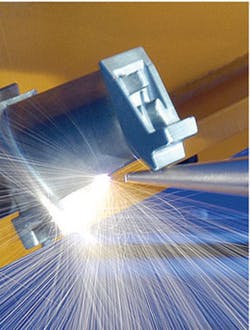Combining High-Speed Laser Drilling with Airflow Testing
Prima North America's Laserdyne Systems is introducing a closed-loop hardware and software package for its multi-axis laser drilling systems that it call a “first of its kind technology.” FlowComp™ combines laser drilling with airflow measurement on Laserdyne 795 and Laserdyne 450 multi-axis laser systems to check drilling results and adjust process settings in line with performance standards.
Laserdyne Systems is a developer and supplier of multi-axis laser processing system, including hardware and software, with over 650 systems installed globally for aerospace, turbine engine, and medical industry manufacturing.
Designed initially at a specific customer's request to meet increasingly difficult aerospace turbine engine requirements, the new package is effective in production of aero and land-based turbine engine components. FlowComp software adjusts the size of laser-drilled holes without operator input to ensure that cooling holes are drilled within tolerance and that the result is verified by flow testing. The end result is consistent processing at very high speed within specification and with data logging in real-time to verify compliance.
First, FlowComp records airflow test results and then adjusts subsequent hole size, as required, so that the laser hole drilling process remains within tolerance over the course of thousands of drilled holes. Higher-quality holes will mean more consistent airflow with no scrapped or re-worked parts. Typically, the parts being processed are high-value components, costing thousands of dollars. Laser drilling is often the last operation performed so it is critical that the process is completed without problems.
According to Laserdyne, FlowComp is significant a significant development because turbine engine components are increasingly complex. To minimize fuel use, noise and pollution, components are now being designed with shaped holes and holes positioned at very shallow angles (10°) to the part surface. These complex holes may be as small as 0.008 inches (0.2 mm) in diameter, making them difficult to laser drill at very high speed. The tight hole tolerances benefit from the ability to make hole size adjustments smaller than 0.001 inch (0.025 mm). FlowComp, along with OFC© (Optical Focus Control) and other Laserdyne-developed features, ensures that there is minimal laser drilling variability by keeping the focused laser beam diameter, location of drilling, and depth of focus required to maintain constant beam quality.
"This new technology was designed to meet the changing needs of the aerospace industry," stated Prima North America president Terry L. VanderWert. “These needs are increasingly stringent and are based on industry desire to have processes that are not dependent on operator judgment for consistent results. Airflow testing and compensation is the next step in the evolutionary process of laser drilling of turbine engine components. FlowComp is easy to integrate into the manufacturing environment, produces positive assurance that hole drilling is under control, and ensures tight tolerances. I am confident that our customers will be using FlowComp as their process inspection tool even when air flow is not specified, particularly when coupled with the built-in data logging feature."
